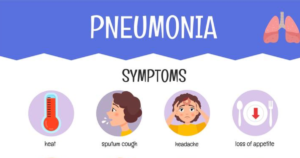What is Pneumonia?
A lung infection known as pneumonia can be brought on by bacteria, fungi, viruses, and parasites. Pneumonia is a chronic disease that appears as a result of the first viral or bacterial infection as per the Best Pediatrician.
Symptoms of pneumonia typically appear two to three days after the onset of a cold or sore throat.
The amount of time, known as the incubation time, between exposure and the onset of pneumonia. The symptoms vary depending on the virus or bacterium that is responsible for the illness. For instance, signs of pneumonia from a respiratory syncytial (RSV) cold in a child take 4–6 days to develop. But the symptoms of the flu virus occur between 18 – 72 hours later.
With the right medications, bacterial pneumonia can last for 1 to 2 weeks. In general, symptoms should get improve a week or so after starting antibiotics. According to the Best Pediatrician Viral infections cannot be treated with medication, thus viral pneumonia symptoms could continue longer.
If your kid displays any of the symptoms of pneumonia, especially if they include any of the following:
- Breathing excessively quickly or having difficulty breathing.
- 102°F (38.9°C) or higher fever, or a fever exceeding 100.4°F (38.3°C) in infants less than 6 months.
The Best Pediatrician says that the most frequent causes of pneumonia are common viruses such as adenovirus, rhinovirus, influenza (flu), respiratory syncytial virus (RSV), and par influenza virus. These viruses also commonly cause colds and flu, and other respiratory illnesses.
Sneezing, coughing, or contact with infected objects or surfaces, such as shared drinking cups or utensils, used tissues, or even doorknobs and faucets, can transmit the infectious viruses and bacteria that cause pneumonia. A person who contracts pneumonia from a sick individual does not inevitably go on to get pneumonia themselves.

Signs and Symptoms of Pneumonia in Children – Best Pediatrician
Pneumonia symptoms vary based on the child’s age and the cause, but frequent ones include:
- Cough & Cold
- Quickly breathing (in some cases, this is the only symptom)
- Coughing or groaning while breathing.
- Chest pain
- Continent pain
- Vomiting
- Decrease in activity
- Older children lose their appetite, or newborns not getting enough food, which could cause dehydration.
- In severe cases, the lips and fingernails may be bluish or grey in color.
A person with pneumonia in the lower portion of the lungs close to the abdomen may experience fever, nausea, and vomiting with little to no breathing difficulties.
Children who have bacterial pneumonia typically fall ill very rapidly, with a high fever and fast breathing.
Children who suffer from viral pneumonia may experience milder symptoms that develop more gradually. Viral pneumonia is more likely to cause wheezing.

Who Gets Pneumonia?
Pneumonia can affect anyone, but some children are more susceptible than others. Pneumonia in children is more likely to occur when:
- Children with long-term conditions including heart or lung issues.
- The children who is suffering from asthma.
- Premature birth of the baby.
- Children with weakened immune systems, such as those with HIV.
Tips to Prevent Pneumonia
- Vaccinate the child with the Best Pediatrician on time. All children should start a series of vaccinations that protect against the bacterial form of pneumonia.
- Even if they have an egg allergy, all kids aged 6 months and older should get vaccinated against the flu every year.
- Teach kids to cover their mouths and noses while sneezing with a sleeve of their shirt or a facial tissue, and to discard tissues after use.
- Surfaces that are frequently touched (such as toys, tables, and doorknobs) should be cleaned with soap and water or disinfectant.
- Teach the child hand washing especially after playing or doing any activity
- Keep smoking out of the house.
Consult with the Best Pediatrician to determine whether further vaccinations are necessary if your child has a weak immune system or is at high risk due to a long-term heart, lung, or kidney ailment.





